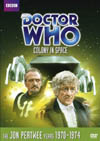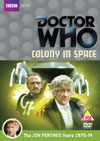Colony in Space
 |
 |
 |
DVD NTSC
Region 1




|
DVD PAL
Region 2


|
VHS Video
NTSC


PAL


|
|
(Doctor Who Story No. 58, starring Jon Pertwee)
- written by Malcolm Hulke
- directed by Michael Briant
- produced by Barry Letts
- music by Dudley Simpson
- 6 episodes @ 25 minutes each, colour
|
Story: Has the Doctor got the TARDIS working again,
or are the Time Lords manipulating it to put him on the
trail of the Master and the stolen Doomsday Weapon file?
The Doctor and Jo soon find themselves
aiding a fledgling human colony on the planet Exxarius.
What strange force is causing the colonists' crops to
wither and die, threatening them with starvation?
Can they defend against the strange animal life that has
suddenly begun to attack them? Or will they have to
give up on this planet and let the mining companies
take over and destroy its ecology?
|
|
DVD Extras include:
- Audio commentary by actors Katy Manning (Jo Grant),
Bernard Kay (Caldwell), and
Morris Perry (Dent),
director Michael Briant,
script editor Terrance Dicks,
and assistant floor manager Graeme Harper,
moderated by Toby Hadoke.
- "IMC Needs You!" making-of featurette (25 min.),
with Manning, Kay, Briant, Dicks, Harper, and the late producer Barry Letts.
- "From the Cutting Room Floor" - location and model film trims (13 min.)
- Pop-up Production Note Subtitles
- Photo Gallery
Buyers' Guide Review
by Martin Izsak
|
|
(A more in-depth analysis, containing "SPOILERS" and intended
for those who have already seen the program, can be accessed
here.)
|
Having recently dubbed himself a "Galactic Yo-yo",
the Doctor makes his first trip back into futuristic
outer space, and sinks his teeth into a fairly good and solid
adventure from writer Malcolm Hulke. This time around it seems
he's only gone far enough to find out where the hippies from
the sixties went and how they are getting on..... facing the
challenges of pursuing their ideals - good stuff.
Hulke seems to be very conscientious in giving all of his
characters and concepts excellent introductions, from the Doctor
and the regulars, to the TARDIS, to each and every guest character.
The TARDIS gets probably the best introduction in the entire Jon
Pertwee era here in this story, the mood for exploring its new
alien landing spot is most wonderfully built up with just the right
hint of fear of the unknown, and even the sound effect is finally
perfect too. But alas, some bright thinker came up with
the idea of going on the cheap with the usual trick dissolve.
All the right footage was in the can, but we are left with
disappointing sudden jump cuts. As these cuts are synchronized
with the final thud, they are coming too late to appear fluent
in visual literacy.
The quality of Hulke's work as a whole on Doctor Who appears
to be sitting on a tipped see-saw to me - half excellent and half
sub-standard. In that analogy "Colony in Space" sits on the fulcrum,
with the excellent stuff having come previously
("The Faceless Ones" (story no. 35),
"The War Games" (story no. 50), and
"The Silurians" (story no. 52)),
and the sub-standard
stuff not quite on the drawing board yet
("The Sea Devils" (story no. 62),
"Frontier in Space" (story no. 67) and
"Invasion of the Dinosaurs" (story no. 71)).
I find this tale to be the
most typical example of a Malcolm Hulke story.
Each episode wisely gives us something new to explore, with the
first one starting off with TARDIS travel and the daily struggles of
colonists, plus a bit of recent mystery thrown in for colour.
Episode Six still manages to deliver one of Hulke's best written
conclusions, particularly for those he wrote all on his own.
The big confrontation between the Doctor and the Master in this story
is one of the best that the Pertwee era has, very successful in
really coming to grips with both characters believably,
and making sense in terms of all
that the Master has done throughout the story.
There is more to be said about this, but of course we'll
save such spoilers for the
in-depth analysis version of this review.
Lots of twists keep the events of the ending surprising and exciting;
even where some of the action sequences had become repetitive,
interest is rekindled as the direct moral argument at the heart of it
is highlighted, and more money, care, and effort is spent on the
final sequence than similar ones leading up to it.
The few minus marks for the conclusion include a loose-end or two,
which I will not reveal here. Add to this the sheer number
of occurrences throughout the story of another typical Malcolm Hulke
trait, where no matter how solid our heroes' plans are, bad luck
and circumstance always seem to allow the villains to knock them back
to square one, and I think it begins to rather subtly betray an
instinct of global martyrdom in Hulke's own belief system. He shows
a passion for knowing what's wrong with society and the world (or
universe as the case may be), but when solutions are called for,
Hulke still doggedly slugs away at stepping on the good and sympathetic
characters, while villains tend to prove capable of getting away
with just about anything no matter how unbelievable it is for them
to do so.
Personally, I suspect that this habitual pattern of thinking
contributed to Hulke's loss of health, and perhaps a metaphysical
reason why he did not follow along with the rest of us on this
planet along a timeline of non-destructive global integration. He
seems to need to wait around for the world to blow up, to say
"I told you so!" and feel righteous. Anyway.....
There is a sense of realism about Hulke's viewpoint in this story,
as, true to real life, most characters in conflict become too obsessed
with their own way of thinking to develop.
This is not without exception this time; however,
most of the characters largely get excellent revealing exposition,
without really changing themselves at all - typical Malcolm Hulke.
Musically, Dudley Simpson manages some new and interesting themes
for travel on the planet surface, and for exploration of the native
city, and of course most of the season's signature Master tracks are
back as well, but perhaps unfortunately these are not as memorable
as the few awful moments when collections of odd silly notes or
stings crash upon us from harsh, ill-chosen synthetic instruments.
When this is endured during the first few appearances of the
spear-toting Primitives, it falsely raises the fear that we will have to
put up with more and more of the same as the Primitives gradually get
more screen time throughout the story. The wash of sound during the
opening scene with the Time Lords is dangerously delicate as well - after
dropping a generation from an old, mono, low-fidelity North American
broadcast, it blots over the dialogue like a heavy smothering blanket.
Anticipation of a good score is thus quickly dampened, even though
a decent score is later delivered. It's not as interesting as that of
the three previous stories this season though.
I enjoy this story a lot. The characters are rich, and the plot
is solid, even if the actors and production team filled in a few holes
as they went along. The production has a few minor rough edges,
typically where optical effects are concerned, but director Michael
Briant does solid work and gets the most important things
right. Acting is of a generally high calibre by all participants -
I particularly enjoy Bernard Kay in this one, in perhaps his most
memorable role on the program.
"Colony in Space" is a winner in my books, along with pretty much
the rest of season eight.
This story is available on DVD and VHS video, in colour.
Click on the Amazon symbol for the location nearest you
for pricing and availability:
 |
 |
 |
DVD NTSC Region 1
for the North American market:

 in the U.S.
in the U.S.

 in Canada
in Canada
|
DVD PAL Region 2

 for the U.K.
for the U.K.
|
VHS Video
NTSC

 for North America
for North America
PAL

 for the U.K.
for the U.K.
(bundled with
The Time Monster [story no. 64] in
The Master Tin set,
only in the U.K.)
|
Comments on this article are welcome. You may contact
the author from this page:
Contact page

LYRATEK.COM
|
Read the Buyers' Guide Review for the next story:
"The Daemons"

|
|








